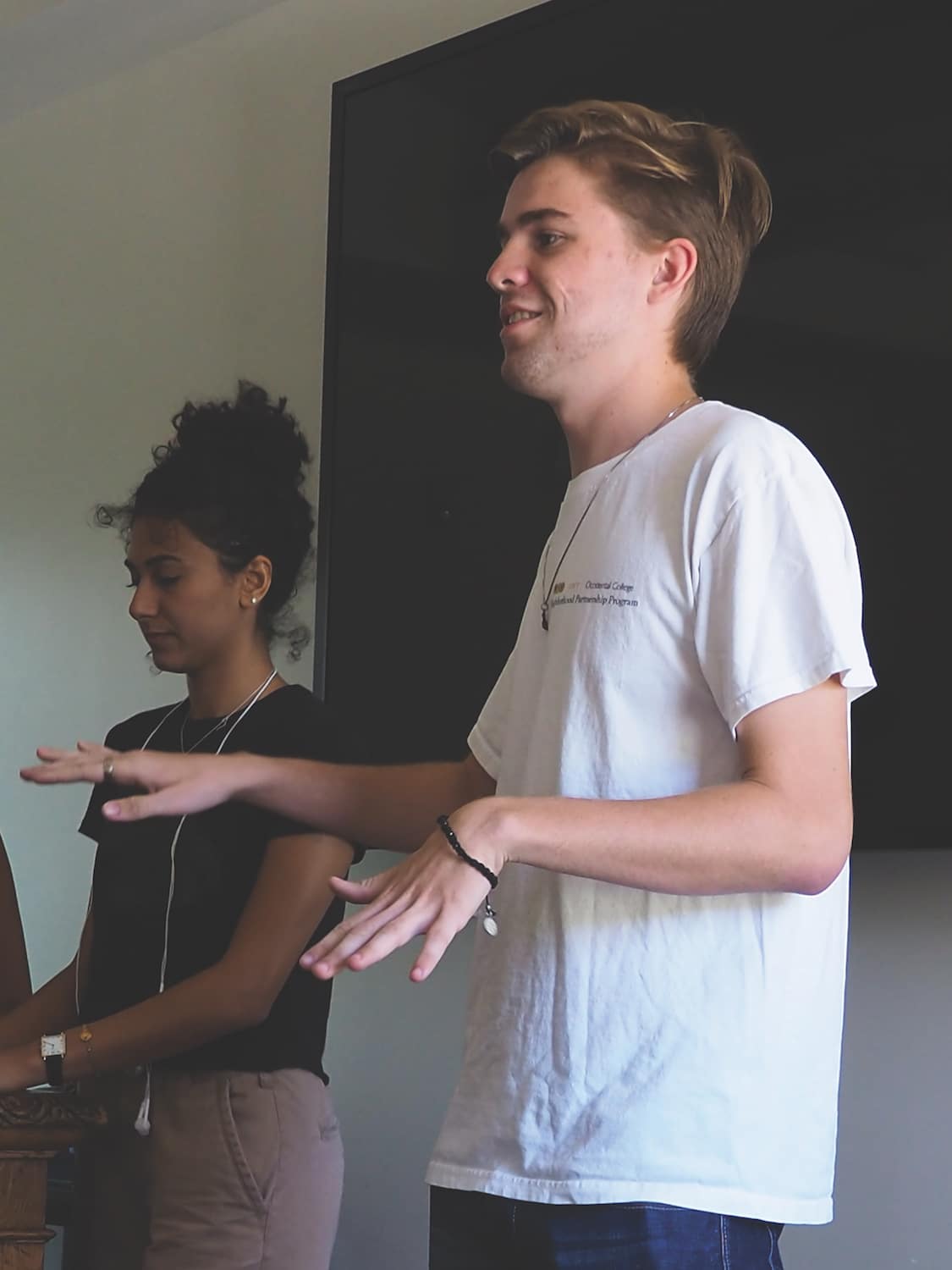
The Occidental Student-Labor Alliance (SLA) hosted its first general meeting of the year in the Morrison Lounge Sept. 11. During the meeting, members introduced themselves to new and returning students, summarized their recent work and outlined plans for the future. Speaking to approximately 30 people, the SLA members explained their mission and involved the attendees in a workshop. Members Layla Hamedi (senior), Henrik de la Torre (junior), Ashley Aulestia (sophomore) and Amber Lee (sophomore) directed the meeting.
Students and staff formed SLA in Fall 2016 following the occupation of the Arthur G. Coons Administrative Center, according to Hamedi. Organized by the Oxy United for Black Liberation group, the occupation sought to bring attention to issues faced by students of color. Inspired by the occupation, students organized SLA in collaboration with workers at Occidental to advocate for workers’ rights and improve relations between students and workers. To date, SLA has hosted mixers for students and workers, organized fundraisers, hosted teach-ins focused on educating the community about campus working conditions and maintained an active online presence to keep followers informed, according to the group’s Facebook page.
In April 2018, the group organized a rally against the college’s outsourcing policies and understaffing of Facilities staff, culminating with Vice President and Chief Operating Officer Amos Himmelstein meeting with SLA organizers outside of Hinchliffe Hall. Himmelstein and SLA members made plans to discuss contract negotiations for Facilities at a later date.
After summarizing their history at the Sept. 11 meeting, the SLA members explained what their work had produced. During contract negotiations over the summer, the Facilities staff, at the recommendation of SLA, rejected the initial contract from the administration, according to Hamedi. The administration then offered a revised contract, which Facilities accepted. Himmelstein outlined some of the new contract’s terms, which went into effect July 24, 2018.
“The new contract included the addition of more than four full-time equivalent employees, upgrades of positions in grounds and dining, increase in the daily meal allowance for dining employees, increased the number of union shop stewards from five to seven, and three years of salary increases,” Himmelstein said via email.
In the same email, Himmelstein also addressed a comment from the April rally in which he stated that Occidental does not outsource.
“Most schools outsource many of their auxiliary services, such as dining, postal operations, custodial, bookstore, etc,” Himmelstein said. “Unlike most schools, Oxy’s auxiliary services are all self-operated by school employees. That is what I meant by Oxy doesn’t outsource our auxiliary departments. However, there are times during the year when the College hires contractors and temporary employees.”
Though motivated by Himmelstein’s commitment to his pledge from late April, members of the group emphasized the need to avoid complacency and inaction.
“Clubs ebb and flow and die. We don’t want that to happen with SLA. The fight is never over,” de la Torre said. “We all are in a unique position as students. Acknowledging our positions is a position of privilege, and with that comes some kind of responsibility, and looking out for those who don’t have as much privilege as us.”

Even with the new contract in place, SLA members made it clear that they want to prepare for the next round of negotiations set to take place in three years, Hamedi said during the meeting.
Hamedi said that while students play a role in SLA, the movement revolves around the workers.
“The workers are the driving component. [SLA is] a liaison,” Hamedi said. “The workers know the issues.”
After discussing their story and work, SLA members directed the attendees through an activity called “Positionality.” With everyone assembled in a circle, participants took turns sharing how they relate to SLA and what the group means to them.
“I stayed [with SLA] because there’s nothing like SLA,” said de la Torre. “The sheer amount of criticalness, thinking about how to improve conditions for workers and using ourselves as a role model to create an ideal community.”
According to Carol Beckett (junior), SLA gives students an opportunity to work for the improvement of the Occidental community.
“The [first meeting of the year] was the first time that I went, but a lot of my friends are a part of it and I really love what they have been doing. [I] wanted to get more involved,” Beckett said.
Following the activity, SLA members concluded the meeting by inviting attendees to write letters of gratitude for the Facilities staff. De la Torre noted that gestures like letter-writing and acknowledging staff members in person around campus go a long way in making workers feel appreciated and combatting indifference toward problems on campus.
“Take something you’ve learned and talk to your peers,” de la Torre said. “Talk to and learn the names of the workers, and keep fighting the good fight.”
![]()



































